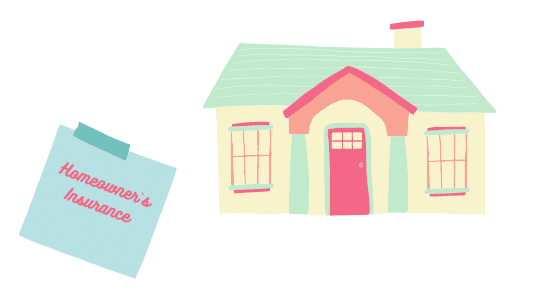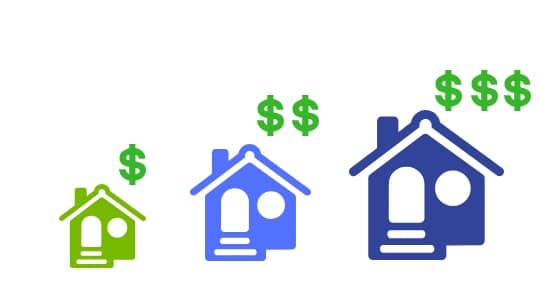Landlord Insurance Vs Homeowners Insurance For Renting Out Property
You might know about a general homeowner’s insurance policy to protect your home or your property. But what if you are turning your house into a rental property or renting out some of the rooms in the property? Or, for that matter, even buying a completely new rental property? In either case, a homeowner’s insurance policy is not enough and you need to switch to a landlord insurance policy.
Landlord Insurance and homeowners insurance policy, both offer protection to your property from damages. But the way they cover you is totally different. And, when you own a rental property, it is the landlord insurance that protects your investment in a much better way versus when you rely on the homeowner’s insurance policy.
What is a Landlord Insurance?
Landlord insurance covers the landlords or the rental property owners for the costs incurred in events of damage, liability, or lost income on their rental property. In a nutshell
- Landlord Insurance Cover Damages:
Having landlord insurance covers you against damages for the perils listed in your policy. The perils can include damages to your rental property due to a fire, hailstorm, flood, earthquake, etc.
- Landlord Insurance Bears Liability Costs:
Landlord insurance further covers you for any costs arising due a liability where you are held liable personally. Be it bearing the legal costs during a lawsuit, or the compensation money awarded to a claimant or the medical costs in case of injury to the tenant.
- Landlord Insurance Covers Lost Income:
When you have Landlord insurance, you can also obtain coverage for the lost income due to the inhabitable condition of your rental property occurring due to the perils covered in your policy. In this case, the landlord insurance policy provides you a fair market rent for a certain time period till your property becomes habitable.
Different Types of Landlord Insurance
The Landlord Insurance Policy is classified into three different types of policies, namely DP1, DP2, and DP3. All these three landlord insurance policies differ in ways on what they cover and how much they cover. The classification is based on damage cover and loss of income cover. The liability coverage needs to be taken additionally with any of these policies.

- DP1 Landlord Insurance Policy
The DP 1 Landlord Insurance Policy is the most basic policy and provides standard coverage from perils (9 Perils) listed in the policy. The damage cost is restricted to actual cost value [1]. The Actual Cost Value (ACV) means the cost of damages are calculated after accounting the depreciation.
The DP1 Landlord Insurance Perils include
- Fire, Smoke
- Lightning
- Wind or Hailstorm
- Volcanic Eruption
- Riots
- Vandalism (never covered on a vacant property)
- Aircraft, and Vehicles (hitting the property)
- Explosion
- Limited Burglary
The standard coverage in all DP1 policies remains the same. However, every second Insurance company is different and can have different kinds of coverage and some extra covers too. So, it is always advisable, you read the fine print of the policy carefully.
- DP2 Landlord Insurance Policy
The DP2 Landlord Insurance Policy provides broad protection and provides damage coverage from 18 Perils. The damage cost is adjusted to the Replacement Cost Value (RCV) which means the depreciation will not be factored for calculating damage costs.
With a DP2 Policy, you are getting more coverage compared to DP1 in the form of more perils, loss of income, and a 30-60 days policy coverage even if a property is vacant.
The DP2 Landlord Insurance Perils include:
- 9 Perils from DP1 Policy
- Freezing Pipes
- Cracks and Bulges of Pipes
- Water or Stream
- Breakage of Glass
- Electrical Damage
- Weight of Snow
- Collapsing Structure
- Burglary
- Falling Objects
DP1 and DP2 both are named-peril policy which means you are only covered for the perils specifically written in the policy.
- DP3 Landlord Insurance Policy
The DP3 Landlord Insurance provides the complete and most extensive coverage to a landlord. It is the open peril policy with all the benefits of a DP2 Policy. This means damage from all kinds of perils is covered apart from those which are explicitly excluded in the policy.
It is the most common type of landlord insurance policy most rental property owners purchase for their properties.
Read: What covers should you include in your Landlord Policy?
What is Homeowners Insurance?

Homeowner`s Insurance is a type of insurance that primarily covers an owner-occupied property. With a homeowners insurance, your home is covered for the cost of damages due to listed perils. And it also provides liability protection from your guests at your property in cases of lawsuits and medical emergencies.
Landlord Insurance Vs Homeowners Insurance For Rental Property
In a nutshell, with homeowner’s insurance, you are just covered for damages to your property and protected from liability. But what about other coverage aspects that the landlord insurance provides you?
- With a Landlord Insurance, you are covered for the loss of income from a rental property which is not at all possible with a homeowner’s insurance policy.
- Homeowners Insurance only covers the liability when the property is owner-occupied. But Landlord insurance provides you liability protection even if you don`t stay at the property.
A homeowner’s insurance isn’t at par with the landlord insurance where insuring the rental property is in question. It misses out the major coverage elements and there can be no denying that you must go for landlord insurance for your rental property.
The only area where a homeowner’s policy provides coverage that the landlord insurance doesn`t is for the personal contents present on your property. And the reason is clear that the landlord insurance is for rental properties and not for owner-occupied properties. Though, you can opt for an additional cover known as Landlord contents insurance for the furniture and appliances that are used to service the tenants.
Is Landlord Insurance Worth It?

Landlord insurance is worth every penny spent on it. It may cost 15%-25% more as compared to homeowner’s insurance. But if you see homeowners insurance is specifically for owner-occupied properties. And if any unfortunate incident occurs on your rental property, you can’t simply rely on homeowner`s insurance.
In such cases where you are renting to tenants and not living on your property, claims via a homeowner’s insurance policy will simply be denied by the insurer. Imagine occurring to personal liability of $1M because the tenant sued you for injuries from a fire that happened due to your negligence of not changing the old wires.
Can you bear the $1M liability all alone without the insurance company paying you? If not, go for landlord insurance if you are renting your property to the tenants.
Do You Need a Landlord Insurance If you Live in the Property?
Renting out a room in your owner-occupied property has an impact on the type of insurance you should opt for your property. If you are renting just one room in your property and the rest are occupied by you, then some homeowner’s insurance companies may give you coverage and you need not switch to landlord insurance.
However, that solely depends upon company to company. Ideally, in such cases, you should consult with your insurance provider and discuss the options. But if you are renting most rooms and doing it strictly as a business, better you switch to a landlord insurance policy from a homeowners association policy.
How Much Landlord Insurance Costs?

Landlord Insurance has various variables and estimating its cost in a plain black and white answer is not possible. Just for a glimpse, landlord insurance can cost anywhere from $600- $2000 depending upon different factors. The cost of landlord insurance mostly depends upon factors like
- Type of Property
- Size of Property
- Location of Your Property
- Types of Tenants occupying the Property
- Age of the Property
- Whether the Rental Property is properly maintained or not
- Types of Amenities provided (Eg. Swimming Pool)
- Whether the Property has a Security System
- Claim History
- Credit Ratings
Each insurer is different and analyzes the risks differently. There can be instances where you get different landlord insurance quotes from two different insurers for the same type of covers. So, it is always advisable you shop around and compare quotes from different insurance companies.
Read: Are you acting on your Landlord Maintenance Responsibilities properly?
If you are renting your property occasionally and not regularly, the cost of landlord insurance goes up. The short term rentals and switching between lots of different tenants increase the risk. Expect to pay double the amount in landlord insurance.
How to Save on Landlord Insurance Costs?
- Try to get your landlord insurance from the same insurer with whom you have other insurances also. In this case, you ask for a slight discount.
- Avoid making claims on your policies if it is not major. With every claim, the premium of your policies increases.
- Have only those covers on your policy which are beneficial. For example, there is no use of having a disaster cover if you have a rental property in Illinois [2].
- Pay the insurance premium in full on an annual basis instead of paying month to month. Insurance Companies offer discounts on paying on an annual basis.
- You can reduce your insurance premium by 8%-10% by increasing the cost of the deductible.
- Have your Rental Property updated with all state and building codes.
- Insurance companies incentivize landlords with a no smoking policy on their rental property.
- Have your tenants carry a renter’s insurance and pet-related liability coverage. Doing so, you are limiting the liability which gets you benefits in the form of discounts from your insurance company.
Read: Why a Landlord must require Renter`s Insurance From Tenants?
How Much Landlord Insurance do You Need?
The amount of landlord insurance you carry depends upon three factors. First being the cost to rebuild your property, second is the liability tolerance and third is the content value in your property. Estimate these costs first and then only you can calculate the amount of your landlord insurance policy.
One thing to note here is that you can estimate the building rebuild cost and content value. But how can you estimate the liability tolerance? The liability tolerance is a personal factor and it depends from person to person. But the thing here is you should get the maximum coverage that you can for your rental property. Saying that you can also consider having an LLC and an umbrella policy for your rental property.
Also Read: Umbrella Policy Vs LLC to Protect Your Rental Property
Is It Illegal To Not Have Landlord Insurance For Your Rental Property?

No, it isn’t illegal to not have landlord insurance for your rental property. But not having one, you are unnecessarily taking risks. And believe it that it may turn into one of the biggest landlord mistakes of your career.
Landlord Insurance may not be compulsion by the law. But when you obtain a mortgage, the mortgage company requires you to buy the insurance. So, if you are taking out a loan to buy a rental property, you anyway need to buy the landlord insurance policy.



This is a good overview of the difference between homeowner’s and landlord insurance. You pointed out that each company may have differences in how they handle certain situations. It’s important to review your policy and ask your agent about any questions that you have. It’s better to take a little time up front to understand your policy than to assume and find out you were wrong when you have a claim.